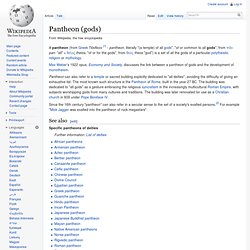

Pantheon (gods) A pantheon (from Greek Πάνθεον [1] - pantheon, literally "(a temple) of all gods", "of or common to all gods", from πᾶν pan- "all" + θεῖος theios, "of or for the gods", from θεός theos "god") is a set of all the gods of a particular polytheistic religion or mythology.

Max Weber's 1922 opus, Economy and Society, discusses the link between a pantheon of gods and the development of monotheism. Since the 16th century "pantheon" can also refer in a secular sense to the set of a society's exalted persons.[2] For example "Mick Jagger was exalted into the pantheon of rock megastars". Specific pantheons of deities. Myers-Briggs Type Indicator. A chart with descriptions of each Myers–Briggs personality type and the four dichotomies central to the theory.

The Myers–Briggs Type Indicator (MBTI) assessment is a psychometric questionnaire designed to measure psychological preferences in how people perceive the world and make decisions.[1][2][3] The questionnaire was created by Katharine Cook Briggs and Isabel Briggs Myers based on an extrapolation from the typological theories proposed by Carl Gustav Jung's 1921 book Psychological Types (English edition, 1923[4]). Jung had theorized that there are four principal psychological functions by which humans experience the world - sensation, intuition, feeling, and thinking - and that one of these four functions is dominant most of the time.[5] Although very popular in businesses around the world, the MBTI is widely criticized by academics for its methodological weaknesses, poor statistical validity and low reliability.[6][7]
Wikipedia's list of fictional expletives.